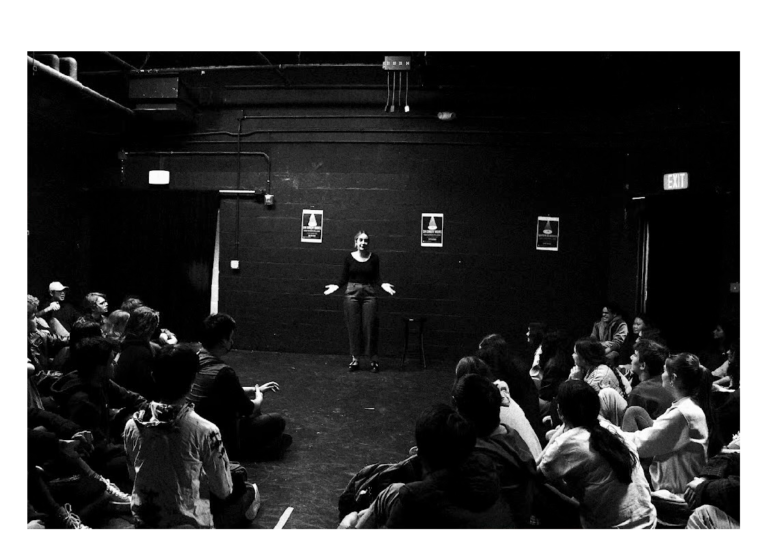Margaret Korinek is a junior from Chicago studying political communication. She went along with this silly idea I had of interviewing herself (inspired by this interview). After watching all the clips I could find of her work–her set at freshman orientation is especially good–I knew she was the person that could commit to this bit.
Korinek is the director of GW Comedy Nights, a student-run org that highlights stand-up comedians of all experience levels who want to perform at open mics. On Feb. 10 they will host their third ever event in the Lisner Downstage Theatre. Tickets are $3 at the door. Korinek will also be performing at ‘Comedy vs. Magic,’ a dual live-comedy live- magician performance on-campus in March. Read about Korinek’s roots in comedy, the love and appreciation she has for her friends and her opinion of men on scooters below.
– Carolina Carmo
Words by Margaret Korinek
Photos by Alexandra Trauber and Colin Bohula
—
Margaret Korinek: Why should people come to the show on Feb. 10?
Margaret Korinek: The Feb. 10 show will be a combination of Comedy Nights veteran comics and students who are trying stand-up for the very first time. No other comedy show in D.C. compares to this wide range of talent and it’s the perfect place to go with your friends before your Friday night plans.
What’s ‘Magic vs. Comedy’?
Comedy vs. Magic is a brand new show that I’m working on with professional Magician Max Davidson and my pal Will Roberts, whom I’ve been doing comedy at GW with for about two years now. We will be battling out our talents on stage on the third floor of D.C.’s world-renowned tater-tot establishment Tonic at Quigley’s on March 2 and 3, tickets are on sale NOW!!!
Why do you do comedy?
Three years ago I would have never predicted that comedy would kind of become my thing at GW, it was a gradual process. I remember going to an open mic to see my friends perform stand-up as an audience member during my sophomore year. After seeing them do it, I thought “oh, I could do this” and then it became a hobby, and then a side hustle and now I’m a director of a group of the best people I’ve met on campus.
Why did you decide to start GW Comedy Nights?
I wanted to provide students at GW an opportunity to try out or hone their craft in live-performance comedy. I wanted to create a group that would not just put on shows for our peers, but also host prep meetings where we could work together on material and become good friends through the entire experience.
Have the people involved in comedy nights become close?
I would say yes. Stand-up is a very terrifying type of performance no matter your experience level. It requires an intense level of vulnerability with yourself and others. Our existence in the comedy trenches (for lack of a better expression) has connected us very deeply.
You said stand-up is a terrifying experience, do you get nervous before going on stage?
Yes, the members of Comedy Nights can confirm that I usually am the most nervous during shows. There have even been times when I’ve had to put myself in time-out backstage and face the wall for a few minutes. In silence. Like a broken NPC.
Why do you get so nervous?
That’s an invasive question.
Margaret, you are literally asking yourself these questions.
Fair enough, Interview Margaret. I think my stage fright spurs from a combination of bad past experiences at mics and the desire for people to like me when I’m on stage.
Does the stage fright get better the more you perform?
I am still terrified every time I step on stage no matter how friendly the audience is. But I find that the more I perform the more familiar I become with those anxious feelings and I learn to be comfortable in the discomfort of it all.
Solve this equation: 3x2 + 6x + 8
37.
Men riding electric scooters?
I’ve said this once, I’ll say it again. Ick. Nothing turns my vagina into sandpaper more than seeing a man tooling around D.C. on an electric scooter. I don’t like being a hater, but gentlemen–is walking not good enough for you all of a sudden? I think we need to establish a Titanic lifeboat-type rule where only women, children and gays are allowed to use the scoots. That joke never bombs because it’s true.
Who or what inspires you for jokes and for pursuing comedy?
My friends. Everyone involved in Comedy Nights, especially the underclassmen who have seen me perform and then decide to try it. They are the bravest people I know. The members of District Debrief, GW-TV’s sketch comedy show, where I spend most of my time. Amelia Magel, Will Roberts, Stefan Ney, Morgan Geoates, Tyv Faggioni-Balcazar, Samar Baig, Jenna Baer and everyone else you know who you are. I live in D.C. year-round and don’t have any family here, and my friends have given me the highest privilege to have them as a support system here. If any of them are reading this right now, hi guys, thank you and I love you all.
What’s the joke-writing process like?
So my friends have told me that I like to do “little dances” during my sets, which I think is their way of saying that I move around a lot on stage and it’s a big part of my delivery style. I failed to realize this trait of my comedy until I found myself pacing my room back and forth before a show cause I needed to work out the punchline of a joke. I never really quite know what I’m going to exactly say when I’m on stage, but I feel prepared when I’ve spent enough hours pacing my floor in anxiety and whispering my jokes to myself in the bathroom mirror like a crazy person while I do my makeup in the morning.
What kind of jokes do you tell on stage?
I think my jokes are in a very narrative style, I tell stories and make observations about the school and people our age. I want to try new styles in the future though.
What new styles do you want to try?
I think deadpan is a very hard humor to master. I’ve been watching a lot of Tig Notaro and she is so amazing I would love to try her style of delivery.
Do you have any popular recurring bits?
I always bring new material on stage, I’ve yet to do the same set twice. I think that has become part of my sort of trademark when audience members who have seen me perform before still never really know what’s about to come out of my mouth.
What if you ever run out of new material though?
Shut up, Margaret.
What songs do you listen to before you go on?
“Finish Line” by Daye Jack, “Rules” by Doja, “Mastermind” by T-swizzle, “Gloom” by Djo, “Girls on Film” by Duran Duran, “Tints” by Anderson Paak, “Gone Girl” by SZA, “Disco” by Surf Curse and anything by Childish Gambino or Two Door Cinema Club.
Heard you like movies or something…four favorites on Letterboxd?
Bridesmaids. Easy-A. Chicken Little. Charlie Brown Thanksgiving Special. Letterbox reviews and GroupMe message likes are the only validation I live for these days. I haven’t done ecstasy before but I imagine it’s the same feeling.
Are you (always) the funniest person in the room?
God, no. And anyone who thinks they are probably isn’t.
So what makes you funny then?
Even though I technically am a stand-up comic, I do not consider myself to be a funny person. Some people will see my sets and not think I’m funny. I’m extremely aware of it. But I like stand-up because it challenges me so I’m going to keep doing it.
So how is stand-up different from other types of comedy?
I think anyone has the potential to “be funny” but stand-up requires you to come up with material that is true to yourself but can also make a room full of people audibly laugh. Every comic wavers on a mental balance beam writing material that satisfies both requirements.
How do you handle the idea of people disliking your comedy?
In many ways. I think that stand-up is the best and worst thing that has happened to me in college.
Worse than getting COVID at the Swae Lee concert last year?
Yes, way worse. I really cannot complain, though, because it has opened me up to a whole new world of connections, and opportunities. I feel more confident in day-to-day life because I’ve been able to face my fear of public speaking.
So what’s bad about it then?
Any comic will confirm that bombing on stage is one of the most god-awful humbling experiences. Comedy can be soul-crushing at times, and the more recognition you get the more negativity you face from others. It’s been a lot of crying and hours in therapy to not assign my worth to those experiences. I’m not good with the attention or pressure that comes with being a comic or director but I’m working on it.
What a sad self-analyzation, Margaret…
I know, Interview Margaret! But it is worth mentioning because these moments have been wonderful learning experiences for me. You have to realize that no one can make me feel a certain way, it’s important not to take things so personally at the end of the day.
Are you going to keep doing comedy after college?
I hate answering this question because I truly do not know. I’m going to do whatever makes me happy. Whether I stick with it and I’m headlining a show, or I quit and manage to make a room full of friends laugh at a dinner party 10 years from now, either situation will be equally fulfilling for me. Stand-up teaches us to enjoy the present moment so that’s what I’m going to keep doing.
Thanks, Margaret.
My pleasure, Margaret.






